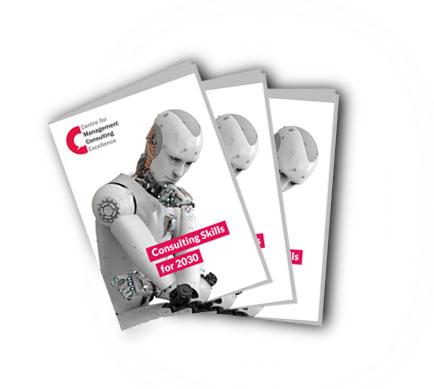Consulting skills for 2030
A report on the skills that management consultants will need to sell and deliver assignments in the future.
In 2018 the Centre for Management Consulting Excellence (CMCE), a pro-bono organisation that brings together management consultants, academics and other stakeholders in the management consulting community, conducted research into the skills that management consultants will need to sell and deliver assignments in 2030.
We sourced data from 157 respondents through face to face interviews and an online survey. The respondents comprised not only consultants and their clients, but a broad range of stakeholders. The consultants came from both large and small firms, and many have management experience in industry.
Respondents were asked to rank and comment on a number of technology and societal drivers of change, in terms of the scale of their likely impact on the skills needed by consultants. The survey then asked whether the traditional skills of a consultant (change management and the like) would still be relevant by 2030. We also gave space in the survey for respondents to provide unprompted insights.
Cyber Security (as a risk management skill) came out top in the impact rankings, with cyber risks being seen by respondents as a potential massive roadblock to a digital future beset by “unknown unknowns”. How to assess the risks, and how much of an organisation’s limited resources should be expended, in a context where assailants are out to destroy your business or steal your IP? While there will continue to be a technical battle between the good and bad guys, management consultants will be expected to drive board level discussions on steering their clients’ businesses through the cyber minefield.
In second place came AI (Artificial or Augmented Intelligence). There was a huge polarisation of views; some respondents see AI as huge disruptor, others see consultants taking it in their stride. Several respondents argue that the full impact will be felt by 2040 not 2030. New consulting skills will be in demand in framing questions, assessing how AI insights can be translated into human capabilities to deliver results, and advising on ethical implications and accountability.
In third place came the trend among consultants towards self-employment. Respondents agreed that concepts such as portfolio careers and work/life balances are here to stay, while also recognising that much of the new technology (AI engines, for example) will demand a level of investment that only big consultancies can afford. Will there be anti-trust legislation by 2030 if big firms act as AI monopolists? Respondents also commented about the pressures for independent consultants to both deliver and sell, with a new breed of agencies already offering to sell.
While coming out lower in the impact rankings, the other prompted themes – Big Data, Globalisation, Internet of Things and Robotics all generated incisive comments.
Timeless consulting skills such as senior relationship building and change management will remain very important in 2030, as humans look to humans to contextualise and interpret the recommendations that technology will generate. This comes with two provisos – consultants must invest in understanding the new technologies if they are going to be able to interpret them, and they must beware the dangers of interpreting purely through the lens of past experience. The T-shaped consultants of 2030 (combining both deep specialist and broad generalist ability) must also need resilience in order to thrive at an increased pace of change.
Click on the link below to read the full report.
